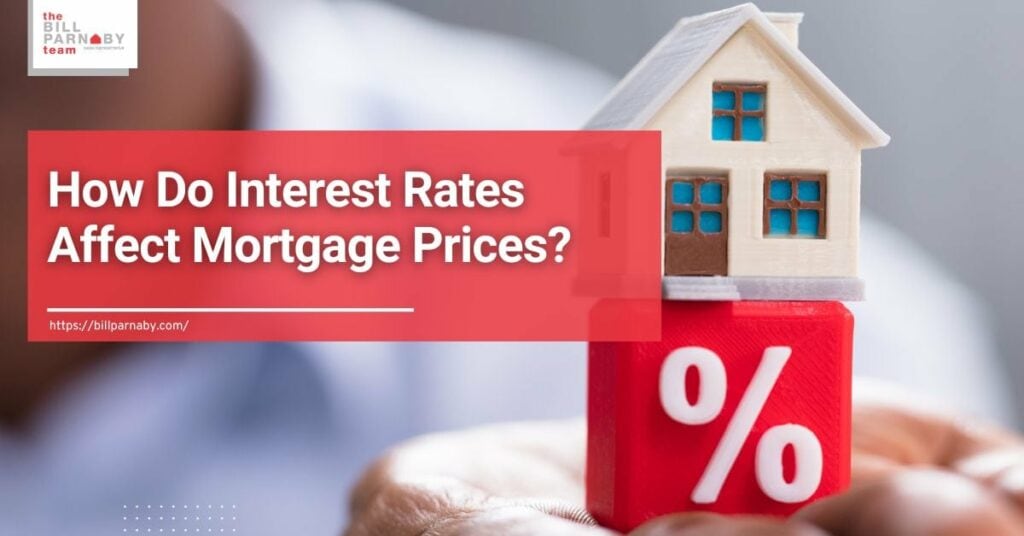Buying a home is an exciting milestone. However, it’s essential to understand all the factors that can impact the cost.
One crucial factor that often leaves homebuyers scratching their heads is interest rates. After all, how exactly do interest rates affect mortgage prices?
If you’re considering buying a home or refinancing your mortgage, this article is for you.
We’ll explore the fascinating relationship between interest rates and mortgage prices. We’ll also uncover how changing interest rates can directly impact you.
So, let’s dive in and navigate the world of interest rates together!
How Interest Rates Influence Mortgage Prices
Here’s the important part: interest rates and mortgage prices share a direct relationship.
When interest rates go up, mortgage prices tend to follow suit. Conversely, when interest rates drop, mortgage prices often become more affordable.
This happens because higher interest rates mean more interest expenses over the life of your loan. As such, it results in higher monthly payments.
The Impact of Interest Rates on Homebuyers
We’ve established the connection between interest rates and mortgage prices. Now, it’s time to explore how interest rates directly affect you as a homebuyer.
Low Interest Rates: Increased Affordability and Purchasing Power
Low interest rates are a homebuyer’s dream come true.
When interest rates are low, borrowing money becomes more affordable. This translates into lower monthly mortgage payments, allowing you to stretch your budget further.
With increased affordability, you may be able to afford a larger home. You may also be able to invest in desirable neighbourhoods that were previously out of reach.
High Interest Rates: Decreased Affordability and Limited Options
When interest rates are high, the cost of borrowing money from a lender increases. This means that your monthly mortgage payments become more expensive.
With higher payments, your budget might not stretch as far. As a result, it may be harder to afford the home you desire.
High interest rates can limit your purchasing power by reducing the amount you can borrow. It may also force you to consider less expensive options that align with your budget.
Changing Interest Rates and Mortgage Refinancing
As with buying a home, interest rates also play a vital role in mortgage refinancing. Let’s look into how changing interest rates can affect your refinancing opportunities.
Interest rates heavily influence mortgage refinancing because they directly impact your potential savings.
When interest rates drop significantly below your current rate, it might be an opportune time to refinance. Lower rates mean you can secure a new loan with a reduced interest rate. This, in turn, could lead to lower monthly payments and substantial long-term savings.
On the other hand, if interest rates rise, your refinancing prospects may become less favourable. Higher rates might mean you won’t enjoy the same potential savings. So, it might not make financial sense to refinance at this time.

Factors That Influence Interest Rates
When it comes to mortgage rates, several factors come into play. Understanding these can help you make informed decisions when navigating the mortgage market. Let’s explore the key influencers of mortgage rates:
- Economic conditions. The overall state of the economy has a significant impact on mortgage rates. This includes inflation, employment rates, and economic growth. In times of economic stability and growth, rates tend to be higher. In contrast, rates may decrease during economic downturns.
- Central bank policies. The central bank plays a pivotal role in setting interest rates. Changes in monetary policy, such as rate hikes or cuts, can directly affect mortgage rates.
- Creditworthiness. Your credit score and financial history can influence the mortgage rate you’re offered. Lenders generally offer lower or prime rates to borrowers with excellent credit. This is because they are considered less risky.
- Loan-to-value ratio. The loan-to-value (LTV) ratio is the percentage of your loan amount compared to the property’s appraised value. A lower LTV ratio often results in lower mortgage rates. It indicates a smaller risk for the lender.
- Loan term and type. The length of your mortgage term and the type of loan you choose can impact your interest rate. Typically, shorter-term loans and fixed-rate mortgages tend to have lower rates. Meanwhile, longer-term or adjustable-rate mortgages may have higher rates.
Keep in mind that rates can vary due to market fluctuations and individual circumstances. So, it’s essential to stay updated and work closely with lenders. These will help you secure the best rates possible for your specific situation.
The Role of the Central Bank in Setting Interest Rates
Have you ever wondered who holds the reins when setting interest rates? Look no further than the Central Bank of Canada.
The central bank, often referred to as the “lender of last resort,” plays a crucial part in the economy. It sets the benchmark interest rate, which serves as a guide for other financial institutions.
A BoC rate increase aims to control inflation and cool down an overheating economy. But how does this affect mortgage prices?
- When the central bank raises rates, it becomes more expensive for banks to borrow money.
- These added costs trickle down to mortgage lenders. So, they also have to increase mortgage rates to maintain their profitability.
- In turn, homebuyers have to deal with higher mortgage prices.
Strategies for Homebuyers
It’s essential to navigate the ever-changing landscape of interest rates strategically. Let’s dive into some strategies that can help you make the most of different rate environments.
When Interest Rates Are Low
- Time the housing market to take advantage of low interest rates. Keep an eye on interest rate trends. Then, aim to purchase when rates are at their lowest. This can significantly impact your monthly mortgage payments and make homeownership more affordable.
- Consider adjustable-rate mortgages. If you plan to move or refinance in the near future, an adjustable-rate mortgage (ARM) can be an option. ARMs typically offer lower initial rates for a fixed period. They allow you to take advantage of low rates while planning your long-term financial strategy.
When Interest Rates Are High
- Evaluate alternative financing options. Explore alternative loan programs or government-backed mortgages. They may offer more favourable terms during high-rate periods. These options can also help mitigate the impact of higher rates on your monthly payments.
- Negotiate with lenders to secure better rates. Remember, competition in the lending market exists. And you may find lenders willing to offer more favourable rates or even match a competitor’s offer. So, don’t be afraid to negotiate with lenders to secure a better mortgage loan.
Steps to Take When Interest Rates Change
It’s essential for homebuyers to stay proactive and adapt to the changing landscape. Here are some crucial steps you can take to navigate these shifts effectively:
- Stay updated. Monitor current interest rates and potential rate hikes. Follow updates from financial news, mortgage providers, and interest rate websites.
- Assess your current mortgage. Understand your existing mortgage terms. These include the interest rate, repayment period, and type (fixed or variable rate mortgage). This will help you gauge the impact of rate changes.
- Evaluate financial goals. Consider long-term objectives and how rate fluctuations align with them. For long-term stays, a low fixed-rate mortgage can be advantageous. In contrast, an adjustable-rate mortgage may suit near-future home sales.
- Calculate potential savings or costs. Utilize mortgage calculators or consult mortgage brokers. This is to determine the financial impact of rate changes on monthly payments and overall loan costs.
- Consider refinancing. If rates have significantly decreased, refinancing could replace your mortgage with a new one at a lower rate. Consider the closing costs and length of stay in the home. Then, weigh these costs against potential benefits.
- Consult with a mortgage professional. Seek personalized advice based on your financial situation and goals. This will help you navigate interest rate complexities effectively.
Remember, interest rates significantly affect mortgages. So, consider these steps to make the most of rate changes and potentially save money on your mortgage.
Do Higher Property Prices Translate to Lower Interest Rates?
No, higher property prices do not necessarily translate to lower interest rates.
Different factors determine interest rates and housing prices. The factors that affect mortgage rates are not directly correlated with home prices.
How Much Does a 1% Interest Rate Increase Affect a Mortgage?
A 1% rate increase on a mortgage can have a significant impact on monthly payments.
Let’s say you have a $200,000 mortgage with a 30-year term. A 1% rate increase could result in an additional $120 in monthly payments.
Over the course of the loan, this increase amounts to an extra $43,200 in total payments.
Considering Interest Rates Before Buying a Home

Interest rates play a critical role in determining mortgage prices. Understanding this empowers you to make the best choices when navigating the homebuying journey.
As a homebuyer, it’s essential to recognize that when interest rates rise, mortgage prices increase. In short, high rates can reduce housing affordability.
Conversely, when interest rates are low, mortgage prices tend to be more favourable. This means low rates allow for greater purchasing power.
Stay updated, evaluate financing options, and seek professional guidance. With these, you can make informed decisions that align with your financial goals.
The Bill Parnaby Team is here to assist you with everything you need to buy a home! Contact us today so we can help you find the best financing option.





